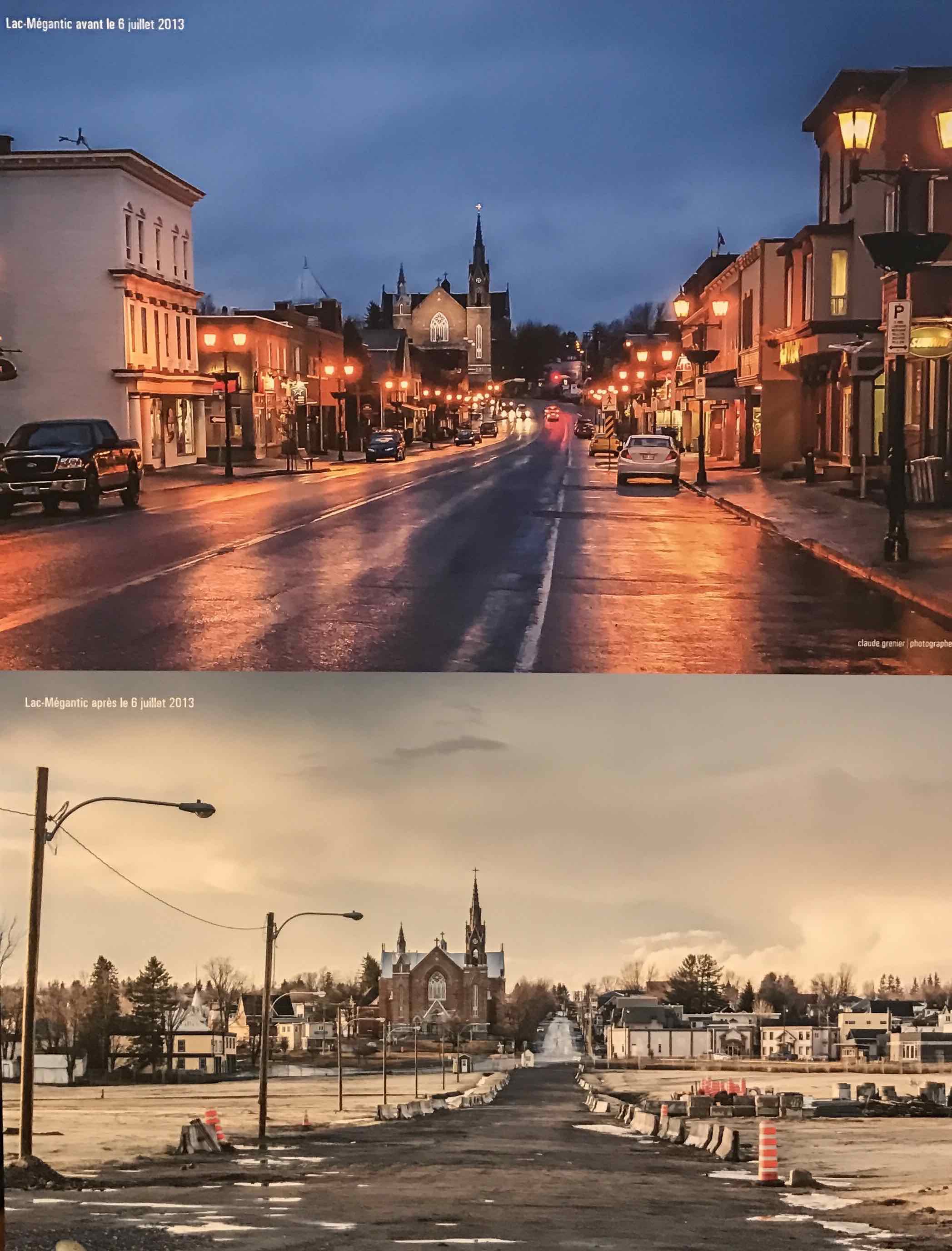Brian Stevens first learned about the Lac-Megantic disaster — in which an unattended oil train caught fire and exploded, killing 47 people in the Quebec town — when he saw the news reports on TV.
Stevens is currently National Rail Director for Unifor, Canada’s largest private sector union, but he previously spent 16 years as an air-brake mechanic working on trains. At a recent conference in Ottawa examining lessons from the 2013 Lac-Megantic rail disaster, he recounted his reaction to seeing those initial scenes of destruction.
“That ain’t Canada, that can’t happen in North America because our brake systems won’t allow that,” he said when he eventually learned the images he was seeing were from Canada. “My heart sank … It was crushing.”
Stevens went on to explain his opinion of the root cause of the problem, summing up the challenges in Canada with one simple statement: “The railways write the rules.”
He also placed blame on the deregulation of the Canadian rail industry that began more than three decades ago.
“Lac Megantic started in 1984. It was destined to happen,” said Stevens, referring to the start of that deregulation.
One example of the effects of deregulation can be seen in the cuts to  the number of people conducting inspections, from over 7,000 railway and rail car inspectors in 1984, down to “less than 2,000” now, according to Stevens.
the number of people conducting inspections, from over 7,000 railway and rail car inspectors in 1984, down to “less than 2,000” now, according to Stevens.
He didn’t mince words about what he’s seen change in the three years since Canada’s worst rail accident.

Lac-Megantic before and after the oil train explosion. Credit: Claude Grenier, Studio Numéra, Lac-Mégantic.
The Railroad Rule That Allowed Lac-Megantic
Stevens’ initial reaction to the images from Lac-Megantic was based on the idea that the braking systems on North American trains would prevent the kind of brake failure and derailment seen in the devestated Quebec town. Which by all accounts is true — if those braking systems are properly applied.
In this case, they were not — as part of company policy, which goes back to Stevens’ assertion that the “railways write the rules.”
There are three components of the braking system on a train like the one which rolled into and destroyed Lac-Megantic. There are the hand brakes and two air-brake systems: the independent brake on the locomotives, and the automatic brake, which holds the rest of the rail cars in place.
Thomas Harding, the person who parked the train that caused the accident in Lac-Megantic, has been blamed for not setting enough handbrakes on the train that night.
What has been overlooked is the corporate policy of not engaging the “automatic brake” when leaving a train on the tracks. Harding set the independent brake and handbrakes but did not set the automatic brake because that was corporate policy.
The brakes he did apply were sufficient to hold the train. But then the locomotive caught fire that night and the fire department cut power to the locomotive, which led to the loss of pressure in the independent brake and the train “running away” down the hill towards Lac-Megantic.
It would have taken Harding 10 seconds to engage the automatic brake. If this had been done, the train most likely would have remained in place until it was scheduled to continue the next morning. But company policy was to not engage the automatic brake even when parking a loaded train of explosive Bakken oil on a hill above a town. Why not?
Because while it only takes 10 seconds to engage the braking system, it takes between 15 minutes to an hour to disengage the system when the train is restarted the next day. And in the rail industry, time is money.
So, in order to save that time, the company simply chooses not to engage the automatic brakes.
The Globe and Mail first reported this situation in March of this year. They asked the Canadian regulatory agency how this could be possible and the response echoes what Stevens made clear:
Asked why the railway was able to issue such an instruction to its staff, Transport Canada told The Globe that its role is “to monitor railway companies for compliance with rules, regulations and standards through audits and safety inspections.” However, the department added, “Transport Canada does not approve or enforce company instructions.”
What Have We Learned From the Lac-Megantic Oil Train Disaster? https://t.co/2zMOijE0DQ #cdnpoli #oilbyrail
— DeSmog Canada (@DeSmogCanada) December 23, 2016
“The Government is Kneeling in Front of the Oil and Rail Companies”
At the conference I attended earlier this month, people from Lac-Megantic were there to share their stories and comment on topics raised throughout the day.
One woman said the problem was that “the government is kneeling in front of the oil and rail companies.” Several commenters said the government was “in cahoots” with the railroads. Another said that by failing to hold the rail companies accountable and putting the blame solely on Thomas Harding that apparently “the government thinks we are idiots.”
Their anger and frustration is not hard to understand. Not only is downtown Lac-Megantic still a large expanse of vacant land three and a half years after the accident, but the government has been non-responsive to their requests and has chosen not to conduct a public inquiry of the accident.
Throughout the day’s discussion it was repeatedly stressed that a public inquiry should take place. But the government has so far denied the residents of Lac-Megantic this opportunity. A public inquiry would allow for people to be called as witnesses and to be questioned publicly. This would mean the CEO of Montreal Maine and Atlantic Railway would likely have to explain to the residents of Lac-Megantic why it was company policy not to set the automatic brake system that might have avoided the deaths and devastation.
Lessons Learned? Nothing Has Changed
Very little has changed with oil-by-rail operations since Lac-Megantic. The trains are still pulling hundreds of thousands of inadequate tank cars each year, filled with highly volatile Bakken crude oil. The last oil train that derailed, in Mosier, Oregon, exploded and burned just like the many before it.
We know the railroads are fighting modern braking systems that would have prevented an accident like Lac-Megantic. We know the American Petroleum Institute will fight any regulations to address the volatility of the oil. We know that even the newer CPC-1232 tank cars are inadequate, and the industry is fighting required upgrades.
There are no regulations on how long the trains carrying this volatile cargo can be. And evidence shows the weight of the trains is likely increasing instances of derailment.
So what are the lessons that have been learned since Lac-Megantic?
The biggest lesson is that, on both sides of the U.S.-Canada border, “Nothing has changed. The railway barons are still there. And stronger than ever,” according to Stevens.
Main Image Credit: Claude Grenier, Studio Numéra, Lac-Mégantic.
Subscribe to our newsletter
Stay up to date with DeSmog news and alerts






